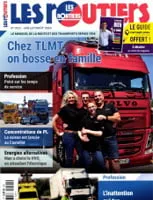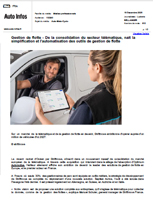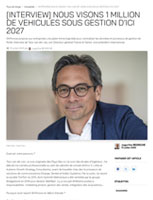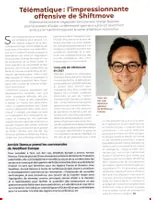
FRA press
Media family: Professional media
Periodicity: Monthly
Audience: 199 947
Media subject: Transport-Logistics
Edition: July - August 2023
Pages: 34-36
Reporter: Loïc Fieux
Pictures: X D.R.
Economy — Fuel Theft
Text: Loïc Fieux • Pictures: X D.R.
It seems that with the fall in diesel prices, fuel thieves (occasional opportunists or organized networks) are a bit less active. However, they continue to be rampant. Faced with this phenomenon, carriers are unarmed. They are only sure of one thing: no insurance will reimburse them for stolen fuel. Let's see what they can do to protect themselves.
Fuel theft is so common because it is both easy and rarely condemned. And if France is an Eldorado for fuel thieves, it's because we know what we risk in court if we manually “correct” the thief caught red-handed. Elsewhere in Europe, the thief is much more likely to be punished.
Add to this the shortage of secure car parks, the high price of fuel which acts as an accelerator of delinquency, not to mention the fatalistic behavior of some carriers, and you will get a climate conducive to fuel theft.
Yes, there is internal theft
Between eco-driving training, reference driver, internal trainer and telematic consumption monitoring, it cannot be said that today's truck drivers are not aware of the cost of fuel. It would be futile to deny that some drivers take fuel for their own use.
Africa is experiencing an extreme situation since the resale of fuel by the driver represents most of his remuneration. Regardless of the continent, carriers that set up a precise control system to avoid thefts must think about the acceptability of their coping. Redistributing a third of the value of avoided thefts in bonuses to drivers is a win-win choice.
Who are the thieves?
To fly, all you have to do is dare. Based on this observation, there is a great diversity of thieves among people who do not have the reflex to go to a gas station to refuel. It's cheaper at a truck tank parked in a quiet location.
We therefore find opportunistic thieves who steal money to fill up their own cars, but also organized networks. Parking at night in a quiet environment exposes to a high risk of theft.
Networks use big resources
They like to use 3.5 t vans loaded with 1000 l tanks on pallets and empty a tank using self-priming pumps that deliver at least 50 l/minute. Such a pump is sold for a few tens of euros and operates on 12 V, simply connected by crocodile clips to a car battery.
Stealing is so easy...
And as in all disciplines, there are heavyweights. In the extreme, thieves use a semi-trailer van loaded with tanks. The same vehicle will then serve as a childminder for buyers, customers of this store.
And who are these customers?
They are often drivers whose fees are paid in the form of cash. When they return, all they have to do is say that they have lost the payment receipts. Obviously, such practices are unthinkable by drivers from Western Europe, but they are not surprising for those coming from Eastern Europe.
The free seat is that of the thief
The method varies, but one scenario is common. As usual, the truck park is full. Would it be good news if a seat were available there during the quietest hours of the night? That's what marauding thieves expect.
A great classic for them consists in placing their vehicle between two road combinations. They are thus hidden by their victims. If you have mirrorcams, you can watch the thieves at work without opening the curtains and blowing your horn. Logically, that should be enough to scare them away.
Yes, you can fly on a highway without entering it
To avoid being trapped in the enclosed environment of a highway and its parking lots, thieves sometimes run a pipe through the wire fence in the highway so that their vehicle can easily escape incognito.
In short, fuel theft is a lucrative business, with its petty offenders and siphoning manufacturers.
Flying from above or from below?
A thief who doesn't want to bend down will go over the top of the tank and then pump or siphon from the fill port or gauge well.
Whoever goes under will aim at the drain plug, the fuel system strainer, or the fuel system itself if he feels the soul of a plumber.
Triple penalty for the carrier
The thick bully will pierce the tank with a pickaxe. And now it's a triple penalty for the carrier. He's losing his fuel, he can't make his rounds and he has to pay for a new tank.
In the worst case, his customer doesn't forgive him for being late and he has to have his truck towed.
This is why many carriers refuse traffic jams with locks. Theft alone costs less than destroying a tank and all its consequences.
Theft is always a loss for the carrier. It weakens its cash flow.
Afflicted but resigned
Louis Ducarroz is responsible for the strategy and support functions of Transports Ducarroz. Based in Isère and specialized in powdery bulk, this company operates around forty units pulled by Volvo FHs, equipped with Volvo Connect telematics, but deliberately devoid of anti-siphonage inserts.
At the time of writing this article, the average price of diesel in France is €1.7. We have seen worse and no one can predict fuel prices in the medium term.
For the small-time thief, a truck tank is simply a “free” gas station. The presence of an anti-siphoning insert may encourage thieves to pierce the tank.
“When it comes to anti-siphonage inserts, there are pros and cons, because thieves tear everything out or pierce the tank. So it is not a guarantee that it will not be stolen. For the same reason, we do not use plugs with locks. We are informed by Volvo Connect of the level in the tanks. With regard to fuel theft, we are content to note the damage. With our fleet of 40 vehicles, we suffer one theft per month with. These flights take place at rest areas, in our warehouse and finally, anywhere”, details Louis Ducarroz.
Entering the resistance
For a carrier, fuel represents a third of operating costs. A driver who saves 1 l/100 km therefore brings 1% profitability.
There are technical solutions to detect theft and attempt to intervene in the event of theft. Let's leave aside locks and inserts that can be counterproductive.
The essential equipment is an ultra-precise gauge. Above all, it allows a relevant comparison between the declared full tank and the volume actually present in the tank. Then, it will detect any suspicious changes in the level in the tank.
And beyond the gauge?
Among the solutions on the market, we find those of Fleetenergies (formerly AlertGasoil), Geoloc Conseils (Fuel Sentinelle, Tank Protect, anti-siphonage.com), or Securifuel (formerly G-Keep, Optimum Automotive), among others.
At the customer's choice, they alert in case of opening the tank or during a suspicious drop in level. Depending on the case, we prefer to set off an alarm or alert silently in order to catch the thief in the act.
Avoid fakes alerts
Secure car parks provide effective protection for the truck, its fuel and its cargo, but they are expensive and few in number.
In the case of Geoloc Conseils, the gauge is sensitive to variations of 1/250th full.
Connected fuel theft prevention systems can be integrated into a carrier's telematics environment and transmit their data to the systems of fleet management.
One of the criteria for choosing is the prevention of fakes alerts. The device must be designed in such a way as to “understand” that the road set is being loaded. This can cause an inclination that is not corrected by the air suspension since the motor is not running and therefore, a variation in the level where the gauge is located.
Interventions by law enforcement agencies
Occasionally, law enforcement stops fuel thieves, but these attacks are marginal compared to the frequency of robberies.
For a carrier, equipping yourself with anti-theft devices sometimes means breaking your equipment in addition to fuel theft.
Securing the park
Reducing the risk of theft by persons outside the company is possible when the fleet is always parked at the depot (regional operation of a captive fleet). In this case, the warehouse must be effectively fenced, illuminated and equipped with video surveillance.
The installation and maintenance of these protections is sometimes prohibitive for carriers.
Alternative energies are exempt
Are we aware of methane (CNG, LNG), E85 or electrical energy thefts on a heavy truck? To date, it is clear that the use of these energies eliminates the risk of theft.
On the other hand, BioG and HVO are accepted by a diesel engine. A sticker warning against the use of BioG by an unsuitable engine has only a limited effect on a thief who often acts in the dark, does not always read French and thinks first of all about resale value.
Diesel theft depends on its price
Policemen and transporters are unanimous. The frequency of fuel thefts depends on fuel prices. The higher the price at the pump, the more fuel is stolen.
Statistics based on complaints mislead us about the importance of the phenomenon because not all thefts are reported. The absence of a declaration is explained by the absence of insurance compensation.
This will not console anyone, but it should be noted that agricultural and public works machinery is also subject to theft.
Word count: 1 730
#gestion_de_flotte, #antai, #alertes, #IA, #mobilité, #économie








